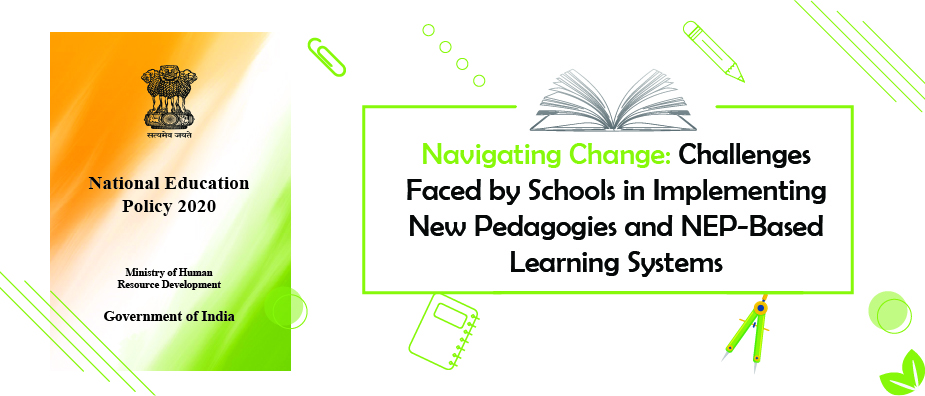Navigating Change: Challenges Faced by Schools in Implementing New Pedagogies and NEP-Based Learning Systems
As education undergoes a transformation to align with the goals of the National Education Policy (NEP) and embrace new pedagogical approaches, schools encounter a myriad of challenges on their journey towards implementation. In this blog, we delve into the complexities and obstacles faced by schools as they navigate the transition to new pedagogies and NEP-based learning systems, shedding light on the barriers that must be overcome to realize the vision of a progressive and inclusive education system.
Complexity of Transition
The shift to new pedagogies and NEP-based learning systems requires a fundamental reimagining of teaching and learning practices. Schools must grapple with changes in curriculum, assessment methods, teacher training, infrastructure, and stakeholder engagement, posing significant logistical and organizational challenges.
Resistance to Change
Change often meets resistance, both from within the school community and external stakeholders. Teachers, administrators, parents, and policymakers may harbor apprehensions about unfamiliar pedagogical approaches, curriculum reforms, or perceived disruptions to established practices, hindering the smooth adoption of new initiatives.
Resource Constraints
Limited resources, including financial, human, and infrastructural, pose significant barriers to the effective implementation of new pedagogies and NEP-based learning systems. Schools may lack adequate funding for teacher training, technology integration, curriculum development, or facilities upgrades, hampering efforts to modernize educational practices.
Teacher Preparedness
Teachers play a central role in driving educational reforms, but many may lack the necessary training, support, or professional development opportunities to effectively implement new pedagogies and NEP-aligned practices. Addressing gaps in teacher preparedness requires comprehensive training programs, ongoing support, and opportunities for collaboration and peer learning.
Assessment Alignment
Aligning assessments with new pedagogies and NEP objectives poses a significant challenge for schools. Traditional assessment methods may not adequately capture students' holistic learning outcomes or skills development, necessitating the development of alternative assessment strategies and tools that align with the principles of competency-based education and formative assessment.
Stakeholder Engagement
Effective implementation of new pedagogies and NEP-based learning systems requires buy-in and collaboration from all stakeholders, including teachers, students, parents, administrators, policymakers, and the broader community. Schools must engage stakeholders in meaningful dialogue, address concerns, and foster a shared vision of educational transformation.
In conclusion, schools face a multitude of challenges in implementing new pedagogies and NEP-based learning systems, ranging from logistical hurdles to resistance to change and resource constraints. Overcoming these challenges requires a concerted effort, collaborative approach, and sustained commitment from all stakeholders involved. By addressing these obstacles with creativity, resilience, and determination, schools can pave the way for a more equitable, inclusive, and transformative education system that prepares students for success in the 21st century.

